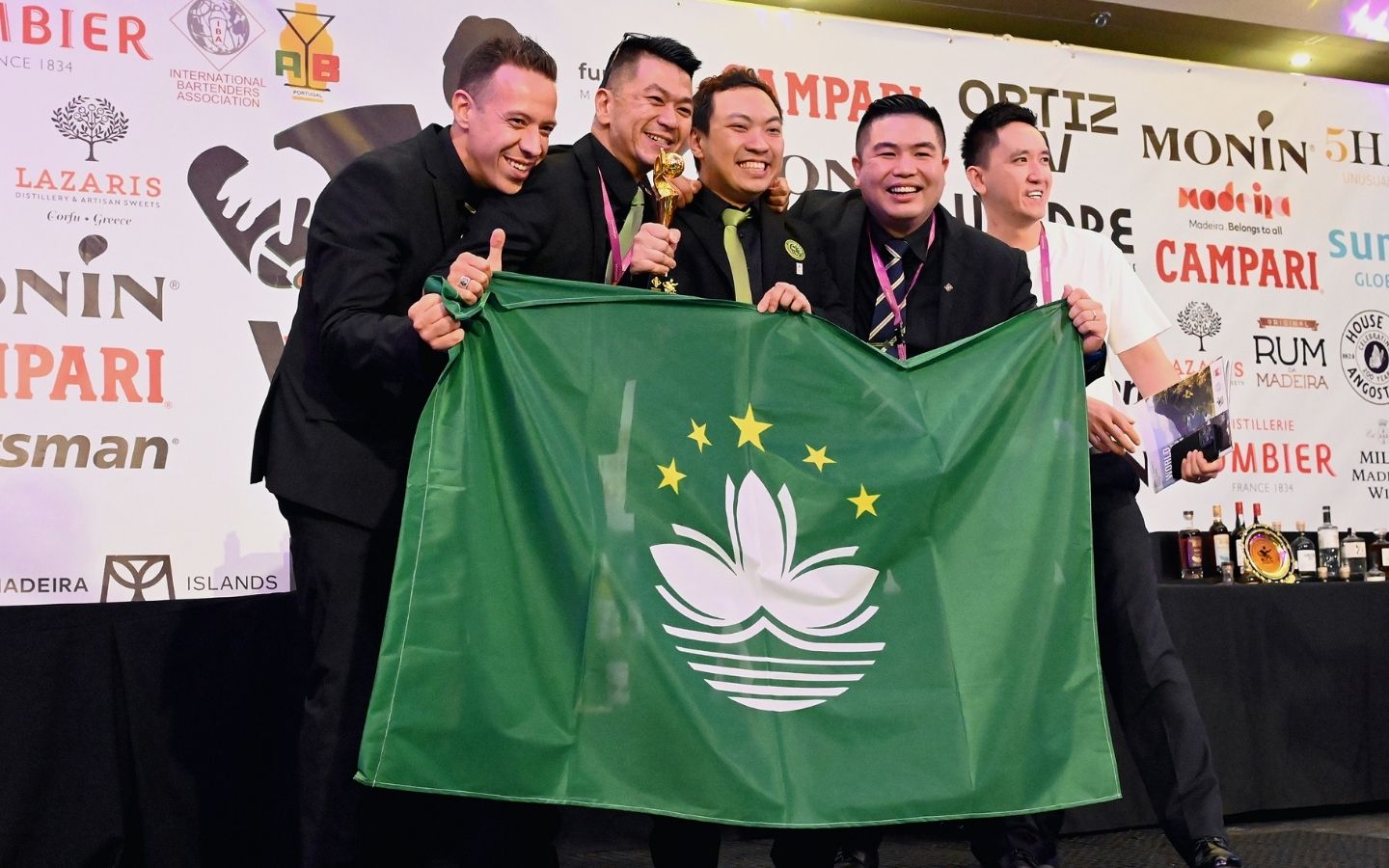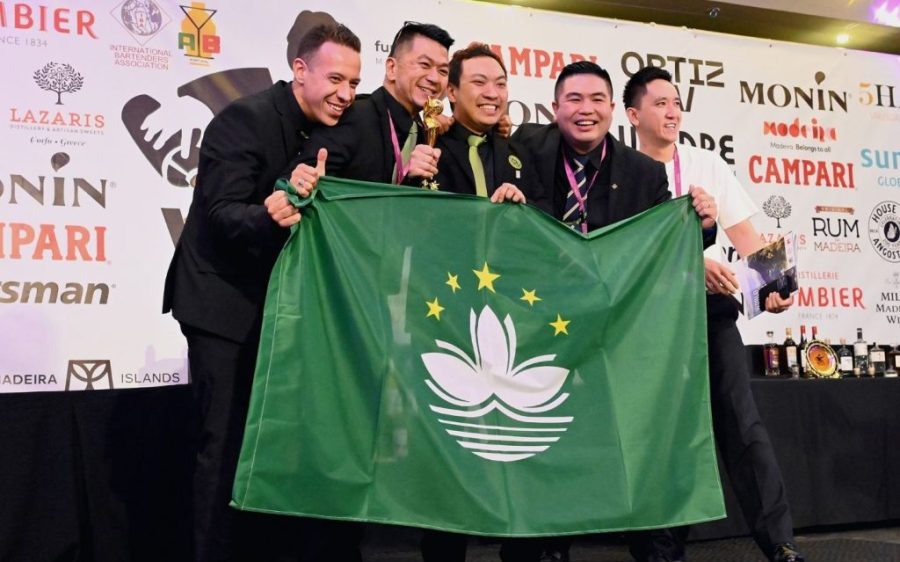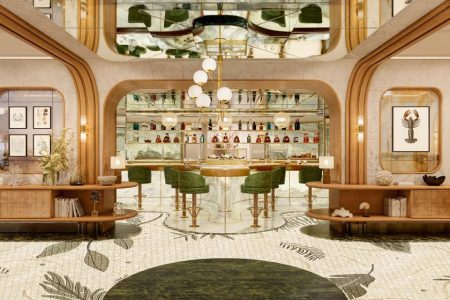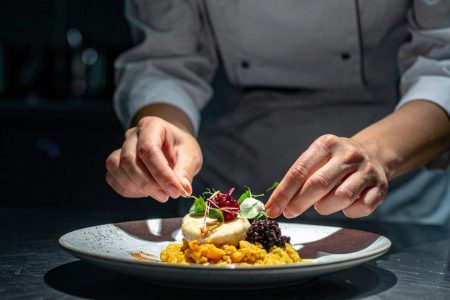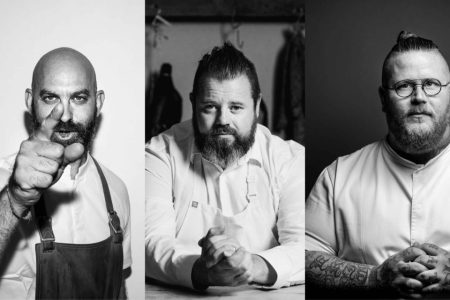In November, Macao nightlife quietly notched a landmark win.
At the World Cocktail Championship in Madeira, Portugal, Frederick Ma, the head mixologist at the Grand Lisboa Palace, was named bartender of the year.
He is the first Macao bartender to win this prize. It’s no small achievement.
The annual event is put on by the International Bartenders Association (IBA), a global society of over 50,000 cocktail makers and shakers represented by guilds in 67 countries.
Frederick had to compete in multiple rounds testing his knowledge, speed and precision. In the classic category, which judges competitors on their skills in drink-making, he came out on top, beating finalists from Ecuador and North Macedonia.
The same day, the Macao team won a group prize in the challenge cup – which includes flair bartending, the flamboyant style of drink-making that often involves juggling bottles as part of the show – and reached the semifinals in another challenge.
[See more: Six independent bars in Macao to visit now]
To Bruno Santos, this win was long in the making.
The Portugal-born, Macao-raised Santos has been a fixture in the city’s nightlife since 2009, when he helped to open Vida Rica at the Mandarin Oriental. In 2012, he started Macao’s first network for professional bartenders, the Union of Bartenders and Cocktails of Macau (UBCM). Four years later, it became an official guild in the IBA.
Under his leadership, the group has grown to more than 100 members, and every year it came closer and closer to winning top honours until Ma’s breakthrough in November.
Now the president of the IBA, and owner of the Black Lotus bar near the Ruins of St Paul, Santos is playing a vital role in shaping the future of nightlife in Macao.
Bruno Santos talked with Macao News about Ma’s big win, the UBCM and why he believes nightlife, if not the city’s tourism industry itself, is facing an existential crisis.
How did UBCM and the IBA come to Macao?
While I was at the Mandarin Oriental, I noticed there was a lack of information in Macao. There were no courses [to help you improve]; there was basically nothing about bartending here. I started searching online and found an elite bartenders course I could take in Singapore. There, I heard about the IBA. It opened my mind to establishing an association in Macao, where we could share information and [unite] people with the same passion.
[See more: Summit of top sommeliers concludes at the Grand Lisboa]
After I came back, one year later, the UBCM was founded. Our objective was to not only do things nationally, but also internationally … so I bid to become a member of the IBA. This process took about three years. In 2016, we became official members. The first time Macao participated in the IBA World Cocktail Championship was in 2017.
What makes the IBA unique?
The IBA is the oldest and biggest professional association of bartenders’, focused on educating new professionals and keeping alive historical references of our beloved profession.
The difference between other associations and the IBA is that we are not about brand knowledge. The IBA values your bartending knowledge in general. It values your professionalism.
How did you find Frederick Ma, the bartender who won the competition?
Frederick is a very talented and experienced bartender. If you want to represent Macao [at the World Cocktail Championships], you have to win our [Macao] competition. You win, and then you have one year with us [UBCM] to prepare you for the world championships. In between, we might go to another competition in Asia or elsewhere if we have sponsors. Frederick won last year. Then we worked together to prepare for the global competition. We work as a team. You cannot achieve anything alone.
[See more: Climate change poses ‘existential threat’ to one of France’s most distinctive wine regions]
We tasted his drinks before going [to Madeira]. We gave our opinions. We thought, as a team, how to coordinate his [entry], because it’s like a performance on stage with steps you need to follow. We are very meticulous in our process. We guide all our bartenders closely to get the best results possible. Frederick did a wonderful job.
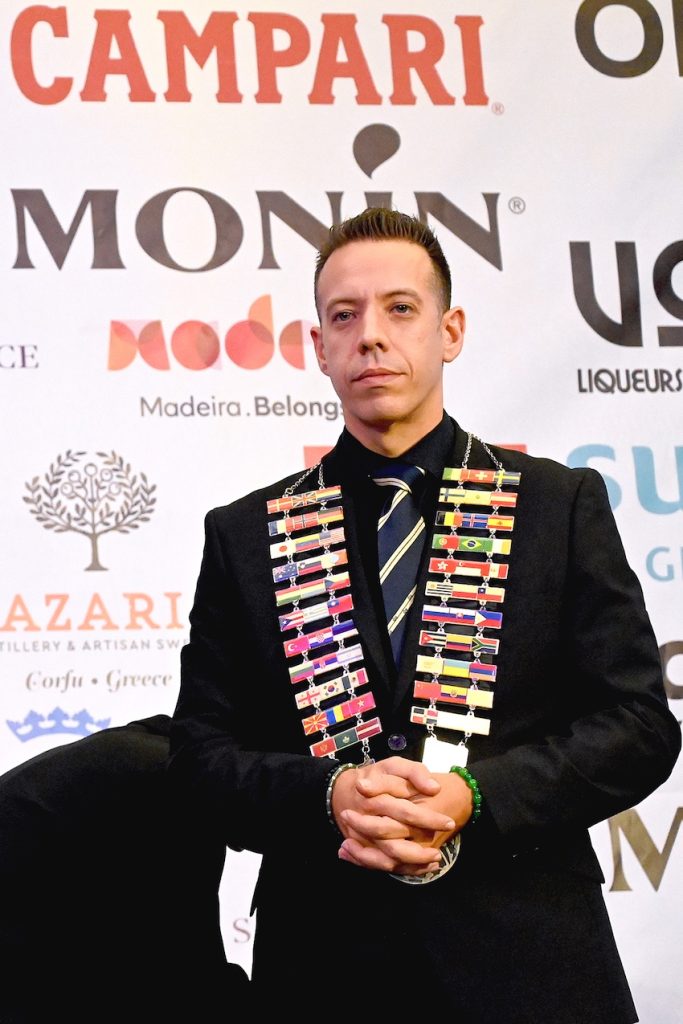
What do you think your wins say about Macao and its hospitality industry?
I don’t think Macao really understands the greatness of our achievement.
In this event, we won three trophies. We have the president of the International Bartenders Association in Macao – actually, the new Secretary General of the IBA is also from Macao. There was news in TDM recently, but I don’t think people cared too much about it, because Macao is still very fixed on, you know, Michelin and 50 Best and those kinds of things.
[See more: Macao’s Got Soul: The story behind the city’s eclectic, old-school wine bar]
Casino properties right now, their ambition is to have a bar on the Asia’s 50 Best list. They don’t think their goal should be to have a cool bar where guests have genuine fun and drink good cocktails. They just think about the awards. Bartenders are always secondary.
What, for you, is a great bar?
A great bar is a place where you feel welcome from the moment you arrive. The host smiles and welcomes you in, and then you go to the bartender, and they are already asking you what you would like to drink while they’re still making another cocktail. It’s all the small things that build up to you knowing that you had a great experience.
[See more: Next-level mocktails: Where to find alcohol-free cocktails in Macao]
All the bars focused on 50 Best are trying to organise guest shifts with bartenders that work with 50 Best Bars, just to see if they can get votes. Bars should think about their real guests, not their bought guests. You know, build up genuine experiences. Then people will always want to go to your bar, and you end up winning awards organically.
Is there a stronger independent nightlife scene outside of hotels?
[The independent bar scene] is thanks to the many young professional professionals who started their careers in Macao. It’s not normal to have Macao citizens work in food and beverage. Food and beverage in Macao is 90 percent staffed by foreign labour. At a certain point, certain operators realise they don’t want to be connected with hotels anymore, for several reasons. They feel like venturing out to develop their own dreams. This happened to me, this happened to other people. Just COVID interfered with many of our dreams.
Did you see an opportunity for change coming out of the pandemic?
I didn’t see it as an opportunity. I saw it as an eye-opener.
We need people to see Macao as a destination for more than just casinos, organically speaking. If Macao doesn’t act on this, it will stop being a destination, even for casinos, because we have Japan, Dubai, Thailand, Vietnam, the Philippines and Cambodia, all of which offer a more complete tourism experience and at a better price, to be honest.
What can be done to drive those changes?
Macao really needs to think about what it wants to do as a destination. Our main business is tourism. But you need more than great nightlife and bars to strengthen it. You also need street markets, more outside shops, more things that attract tourists.
[See more: Hong Kong’s Bar Leone is now the world’s second best bar]
There are so many things we can do that are outside of the box. We need to have professionals to do it. And that doesn’t mean buying minds from Singapore or Malaysia, because we have creative people in Macao.
What role can nightlife play in making Macao a more vibrant destination?
It’s not only bartending, but also more concerts, more DJs, more entertainment events. This will bring people from Hong Kong – people from the region who are not even thinking of coming to Macao for casinos, but for entertainment. We need to have [events like these] every weekend. To reopen a water show is not enough.
Do you think Macao’s success globally could draw new attention to nightlife’s potential at home?
Not necessarily. Our achievements are because of our commitment. We’ve been organising national competitions without government support for five or six years. We work hard throughout the year to generate money for flights and work with brands. We did it by ourselves. I mean, we have over 100 cocktail aficionados who are members of the UBCM. If you go to hotels and bars, you’ll find a lot of people wearing our association pin.
You’re opening a bar academy. Can you tell us more about it?
With our Bar Academy, we can train people directly for every casino, every hotel, anyone that wants to learn about bartending. I think this will contribute more to Macao [than winning awards]. We hope to launch it early next year.
[See more: Planning to limit the booze this holiday season? Here are five pointers]
[Among other initiatives], we want to start a social responsibility course through the IBA and make it mandatory for every professional in the industry in Macao. It would give you general knowledge about what alcohol does to your body – the different reactions – and how to control alcohol-related behaviours. It would work like a license.
What excites you about bartending in Macao today?
I’m super excited because I started receiving guests from all around the world for our Lotus Prestige Cup, an international baijiu competition [on December 4 and 5]. It’s very new. We planned it in just three weeks. People are coming in from the US, Colombia, Ecuador, Puerto Rico, Finland, Holland, Germany and more. We’ll give them different bottles of baijiu, and they will have to make cocktails with their spirits.
Macao has also been nominated to host the World Cocktail Championship in 2026. I’ve been organising the championship since 2022. To organise it in Macao is another challenge, but I feel comfortable because I’m at home.
